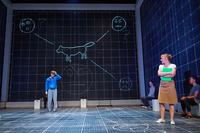One of the joys of reading The Curious Incident of the Dog in the Night-Time is experiencing the world through the eyes of Christopher Boone, whose powers of logic and perception work so differently than mine. Christopher describes his mind at various points as a machine, a computer, or a film: he notices many small details that other people might overlook or filter out, and he has an excellent memory. When recounting stories of his mother, Christopher describes recollection as simply pressing REWIND on a DVD player to revisit a scene from his past in full color, sound, and smell (76). Obviously, these powers of perception are immensely helpful to Christopher’s detective work, although there is a drawback—too much information overwhelms him. Early on, when police question him about his neighbor’s dog, Christopher compares his mind to a jammed machine:
[The policeman] was asking too many questions and he was asking them too quickly. They were stacking up in my head like loaves in the factory where Uncle Terry works. The factory is a bakery and he operates the slicing machines. And sometimes a slicer is not working fast enough but the bread keeps coming and there is a blockage. I sometimes think of my mind as a machine, but not always as a bread-slicing machine. It makes it easier to explain to other people what is going on inside of it. (7)
Christopher's use of simile ("the mind is like a machine") makes it easier for us, as readers, to understand him better. Christopher also uses simile to explain to himself what is going on inside other people’s minds, which he had difficulty understanding until he decided to think of other people’s minds as puzzles to solve and researched how the mind works. In his reading, he learned about a fallacy called the homunculus argument in which "we think we’re looking out of our eyes like we’re looking out of windows and there’s a person inside our head, but we’re not. We’re looking at a screen inside our heads, like a computer screen" (116). The difference between his mind and most other people’s minds, Christopher thinks, is that many people see things on the screen of their minds that aren’t there—hopes, fears, fictions—and he only sees what is.
For as long as humans have been thinking and writing down their thoughts, we have come up with similes to explain how thinking works, just as Christopher does; the homunculus is only one example. Another enduring example is the tabula rasa, the idea that our minds are blank pages on which knowledge is inscribed as we experience life. This idea can be traced back to ancient Greek philosophy, but it was revitalized by 17th- and 18th-century philosophers who wanted to emphasize the role of scientific observation in knowledge. One such philosopher was John Locke, who not only used the tabula rasa simile but also compared the mind to an empty room which could be "furnished" by ideas. The idea of the mind as a room was adapted by Sir Arthur Conan Doyle, whose iconic character (and Christopher Boone’s hero) Sherlock Holmes describes the mind as "a little empty attic, and you have to stock it with such furniture as you choose" (from A Study in Scarlet). Fans of the BBC adaption are better acquainted with this idea in the form of a "mind palace."
Personally, I can’t imagine my own mind as a machine, or a room, or even as a blank journal to be filled with writing. When I'm working through a project or a problem, I often describe myself as stewing or mulling it over. When I started my first blog as a graduate student, I imagined it as the receptacle for mental foam that separated itself from the rest of my mind and floated to the top, like frothed milk. I am sure either of these messy liquid comparisons would horrify Christopher, not to mention Sherlock Holmes. But like Christopher’s bread machine, there are benefits as well as drawbacks to having a mind like a pot of soup or a cappuccino. I may not be as orderly and observant as Christopher, but scooping froth from the top of my mind means that I can prioritize and separate irrelevant details from what’s brewing beneath. Stewing, to me, means bringing together ideas the way ingredients in a soup mingle into a flavorful broth.
How does your mind work?
**Check back every #OneBookWednesday during the Reading Period for some more One Book food-for-thought!**
Have a question for Free Library staff? Please submit it to our Ask a Librarian page and receive a response within two business days.

